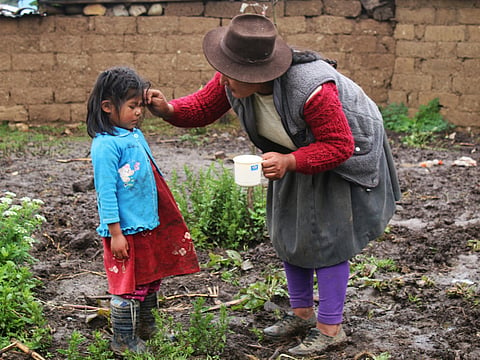Dubai Cares launches Dh1.8m programme for Peru children
Funds will support parents and others to care for hundreds of children in poor areas

Dubai: Dubai Cares, part of Mohammad Bin Rashid Al Maktoum Global Initiatives, has announced a three-year programme to bring Early Childhood Development (ECD) support to 500 disadvantaged children in Peru.
The programme, being implemented in partnership with local NGO Kusi Warma, provides training and coaching to 351 families of children below the age of three, through project technical team and community agents at the ECD centres, as well as through home visits.
In addition, the programme provides training to 32 community agents on topics such as health, nutrition, education and protection.
The Dh1.83 million ($500,000) programme aims to help consolidate Kusi Warma’s Model of Comprehensive Care for Early Childhood in Peru (MAIPI) Centres, in the nation’s heavily rural Turpo and urban marginal Ventanilla districts. It is set to reduce ‘growth delay’ among infants in the target districts, which is characterised by stunted physical, psychological and social development. The programme also provides support to 14 ECD centres to ensure continuity of operation, and encompasses parental education on health, nutrition, early education and safety.
Annina Mattson, programmes director at Dubai Cares, said: “Education plays a remarkable role in contributing to the overall physical, psychological, and social development of a child. However, for many in Peru’s rural and urban areas, the early years of life are dominated by hardship, as access to adequate education, nourishment, clean water and other essential rights are sparse. I’m confident that our new programme in Peru will serve as a powerful catalyst for improving early childhood practices, enriching the learning experience of young children as well as enhancing their surrounding environment.”
Gloria Navarro, executive director of Kusi Warma, said: “We are very happy to have started this mutual collaboration with Dubai Cares. We value the decision of working together to support Peruvian children through the provision of early childhood development. We feel committed to excelling in our work so we can show evidence of our accomplishments in this field, in the hopes that this experience could be scaled and replicated to other areas of Peru that face the same conditions of poverty and exclusion, especially the rural and Amazonian areas.”



